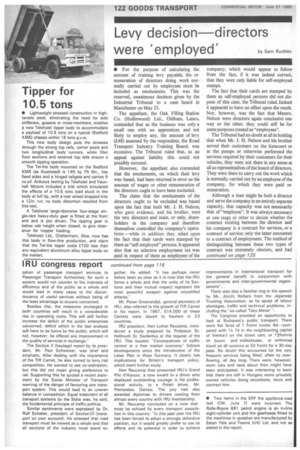IRU congress
Page 124

If you've noticed an error in this article please click here to report it so we can fix it.
report continued from page 116
zation of passenger transport services to Passenger Transport Authorities; for such a system would run counter to the interests of efficiency and of the public as a whole and would lead in many cases to the discontinuance of useful services without being of the least advantage to anyone concerned.
Besides this, the measures envisaged in both countries will result in a considerable rise in operating costs. This will still further increase the deficit of the public enterprises concerned, deficit which in the last analysis will have to be borne by the public, which will not, however, be offered any improvement in the quality of services in exchange."
The Section II (haulage) report by its president, Mr. Paul Schweizer, was brief and emphatic. After dealing with the importance of the TIR Carnet, he also turned to lorry/rail competition. He wanted to see co-ordination, but this did not mean giving preference to rail. Supporting this he quoted a recent statement by the Swiss Minister of Transport warning of the danger of favouring one transport system. This would lead to an uneven balance in competition. Equal treatmentof all transport systems by the State was, he said, the fundamental principle of traffic politics.
Similar sentiments were expressed by Dr. Rolf Schober, president of Section III (transport on own account). He stressed that road transport must be viewed as a whole and that all sections of the industry must stand to
gether. He added: "It has perhaps never before been so clear as it is now that the IRU forms a whole and that the unity of its Sections and their mutual respect represent the most powerful weapon against unjustified attacks."
Mr. Pieter Groenendijk, general secretary of IRU, also referred to the growth of TIR Carnet in his report. In 1967, 514,000 of these Carnets were issued to hauliers in 23 countries.
IRU president, Herr Lothar Raucamp, introduced a study prepared by Professor Dr. Hellmuth St. Seidenfus at the request of the IRU. This booklet "Consequences of traffic control in a free market economy" follows developments since the introduction of the Leber Plan in West Germany. It clearly has implications for Britain's transport policy, which merit further study.
Herr Raucamp then presented I RU's Grand Prix d'Honour, a new award to a driver who displayed outstanding courage in his professional activity, to a Polish driver, Mr. Premyslaw Osinski. The jury had also awarded diplomas to drivers coming from almost every country with IRU membership.
Mr. Raucamp concluded on a note that must be echoed by every transport association in this country: "In this past year the IRU has been forced to adopt a strongly defensive position, but it would greatly prefer to use its efforts and its potential in order to achieve improvements in international transport for the general benefit in conjunction with governments and inter-governmental organizations".
There was also a familiar ring in the speech by Mr. Jinichi Nohara from the Japanese Trucking Association, as he spoke of labour shortages, traffic and technical problems, including the "so-called 'Tako Meter' ".
The Congress provided an opportunity to look at Budapest's public transport. There
were flat fares of 1 Forint {under 4d compared with 1s 7d in the neighbouringi capital of Vienna!) on the street cars, or 12Forints
on buses and trolleybuses, or unlimited travel on all systems at 50 Forint for a 30-day pass, No doubt this accounted for the very frequent services being filled, often to overflowing, all day long. There were, however, more cars and taxis about than might have been anticipated, It was interesting to learn that there are still in Hungary some privately ewned vehicles doing excursions, tours and contract hire.








































































































































































































